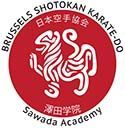Brussels' Shôtôkan Karate-dô Sawada Academy
Japan Karate Association
Japan Karate Association
Frequently Asked Questions
- At what age can a child join the karate class?
The club accepts children from 5 years old and above and we have children's classes specifically for this.
In the beginning, the child will learn about discipline and karate etiquetes which is a very fundamental part of Karate.
Thereafter, the child will progress to techniques, and improving coordination and be on their lifelong journey to being a Karateka.
- What type of payment methods do you accept?
Payments can be made cash and paid directly before commencement of the class or by bank transfer.
- Is the karate training safe?
As in all sports, there is always an unpredictable small risk element of injury. The risk is not higher than other common sports.
We emphasise alot on self-control, safety and respect for members. The instructors have many years of teaching and training experience and will intervene if contacts are excessive or inappropriate.
Protection gear is not used during training as in line with traditional karate teaching philosophy. As it gives a false sense of security. However, should you wish, you may use them.
- What is the philosophy of karate?
Daily life commitments push us to forget the benefits of exercising, both for the body and the mind. Karate practice enforces the muscles, develops coordination, stimulates reflexes and improves stamina. Serious practice develops coolness, allowes a clear mind, a deeper awareness of our mental abilities, and self-confidence. Karate is not a goal, but a way to achieve one. Every black belt holder becomes a Bushido ambassador.
Nowadays, many people consider karate as a sport, one must score, win bouts, and its spiritual aspects are often replaced by the need to dominate others. Rather than enforcing egocentricity, Budo should drive people to see one as part of a group. There’s no place for ego in the dojo. Traditional karate practice builds up character and teaches to respect training partners. Determination, sincerity, sense of effort, etiquette and self-control are needed in the dojo. In other words, the karateka must strive for philosophical and physical development.
- I am joining for the first time. What should I be aware of?
We welcome all beginners! Do arrive about 15mins before the training commences so we can help you settle in.
For the first few times, you can train with usual sports attire. Eventually, you should invest in a karate-gi (karate attire).
If you are totally new to karate, the instructor will assign a 'Sempai' (senior student) to explain to you dojo etiquettes and basic techniques. This way you will feel comfortable as you continue to learn and improve.
We know how you may feel as we all started karate the same way as you are doing now, a complete beginner.
- What happens during a typical class?
All classes start with a warm-up. During the class, we explore basic and advance techniques with explanations in French & English.
A typical class consists of Kihon (basic techniques) and bunkai (application of techniques in situations). Generally followed by Kata (Techniques pattern), a combination of Kihon and Bunkai.
Sometimes, you may feel lost following the class, but don't worry as this is normal. Your partner or Sempai will guide you along.
You will never learn everything at once, which is why Karate is an art, taking time to improve and progress.
- How often do belt grading exams take place?
There are regular grading exams at club and federal level.
There is a minimum number of trainings to qualify for the exam. Qualification for grading exams does not mean you will pass. The exams are based on techniques you should know and be able to demonstrate your knowledge.
The grade or belt level helps you to identify at which level you are at and continue to improve. At times, a double grade promotion may be given if the karateka can demonstrate techniques beyond the pre-requisite required and with outstanding karate spirit.
The grading or belt level attained is recognised at a national level and accepted at any JKA club or dojo in Belgium.
- Besides training at the club's dojo, where else can I train to progress?
Being a registered member of our dojo gives you access to train at provincial and federal levels which are free.
There are special weekend tranings at other clubs in Belgium requring only a nominal participation fee.
3 times a year, a stage (Karate camp) is organised at a national level where hundreds of karatekas (including people from other countries) of all levels gather to train with specially invited instructors from Japan.
The stage takes place during Easter in Louvain-la-Neuve, July in Gent and November in Brussels at our dojo. Participation in the stage requires a nominal fee.
- How long does it take to achieve Black Belt?
If training is done consistently and regularly, it takes 5-6 years to pass the 1st dan exam. The exam is conducted at a national level and the grade is certified by the Japan Karate Association (JKA) based in Tokyo.
However, achiveing black belt should not be the only reason you train in Karate as the martial arts offers an important mental and philosophical aspect that should not be ignored.
Ask any black belt holder in the club and the usual response is that karate starts at black belt and it is a life long learning process
- I come from another karate style or club with previous experience and wish to join this dojo. What should I be aware of?
Come about 15 minutes earlier before the commencement of the class and speak to the chief instructor, Sensei Sawada.
Contact Us
We will get back to you as soon as possible.
Please try again later.
